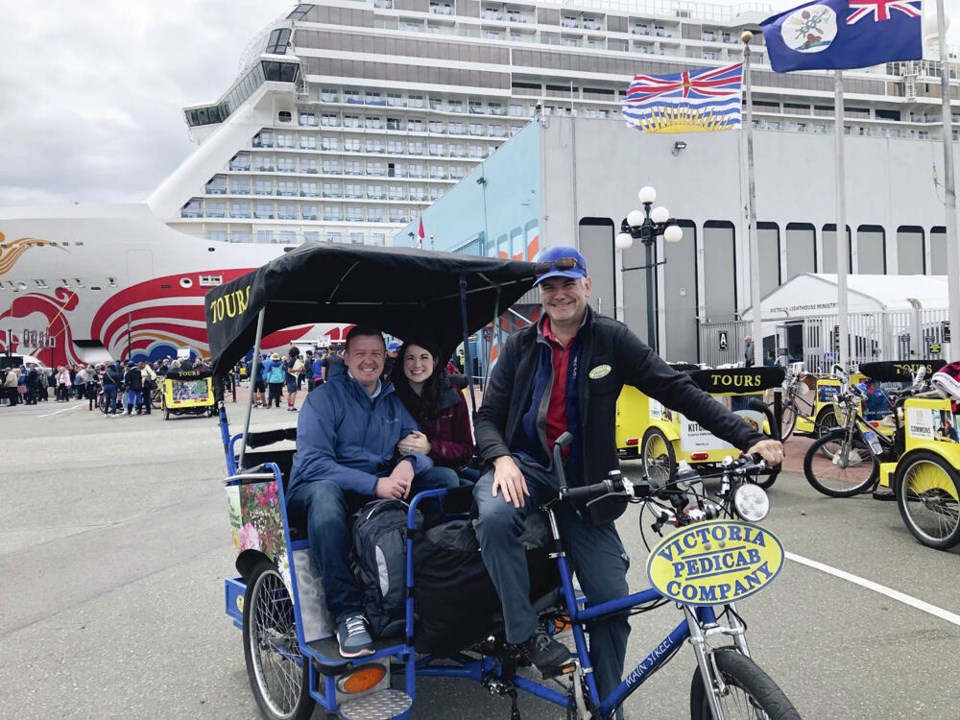The cruise ships will start arriving in Victoria in less than a month and a hiring blitz is on.
But how full those ships will be and how many passengers will disembark to spend their money remains a guessing game as tourism businesses low on cash flow after two pandemic seasons start to scale up hiring amid heavy competition for workers.
“Passengers could be half of what they used to be or it could be completely bonkers crazy,” said Andrew Capeau, owner of Victoria Pedicab Company.
“I’m in the same situation as everyone else because we really don’t know what [tourism] is going to look like,” he said. “I think what we all know, though, is that people really want to get back to living and travel.”
Like many tourism-reliant businesses, Capeau has lost more than half of his 36 operators since 2019, and he’s challenged to rebuild his fleet because workers are hard to find. “A lot of them transitioned back to school or other jobs over the pandemic,” he said.
Anna Poustie, chair of the Victoria Cruise Industry Alliance — a group of retail and industry service providers supporting Victoria’s cruise-ship economy — said initial expectations are that the early ships will be at about 70% capacity. Of the total passengers on board, typically about 80% leave the ships and venture into Victoria.
Ogden Point is expecting 350 ship visits from April 6 to early October with an estimated 759,000 passengers — higher than the last cruise season in 2019 which brought 709,000 passengers.
“For a lot of businesses, it’s a balancing act [on hiring],” said Poustie, adding most want to ramp up and secure good employees, but have to be cautious considering many have been struggling in red ink for two years.
Transport sa国际传媒 announced the latest COVID-19 rules on cruise ships this week, saying passengers must be fully vaccinated and tested. Ships must also have plans to manage outbreaks.
Under the guidelines, passengers have to be tested before boarding at departure points and also before disembarking at their final destination and other ports of call, including Victoria. The Greater Victoria Harbour Authority said sa国际传媒 Border Services Agency will confirm vaccinations and testing before passengers get off the ships.
Poustie said many tourism operators are paying above the minimum wage of $15.20 per hour, and some are offering what is considered Victoria’s “living wage” of $20.46 an hour, or higher.
The living wage is calculated as the hourly amount that each of two working parents with two young children must earn to meet their basic expenses (including rent, child care, food and transportation) once taxes, credits, deductions and subsidies are taken into account.
Pacific Northwest Transportation, which provides shuttle services downtown and to Butchart Gardens during the cruise season, is hiring ticket sellers, guides and drivers at living wages during the season.
It will be among two dozen companies at a job fair March 19 at Ogden Point, including the harbour authority which is hiring maintenance and landscaping crews as well as dock staff for the Inner Harbour and Fisherman’s Wharf.
Employers are hiring to fill hundreds of positions. They are seeking youths and post-secondary grads transitioning into careers as well as people looking to stay active in their retirement years.
Poustie said cruise ship passengers and crews spend $130 million over a typical season.
Sabrina Harvey, office manager for Orca Spirit Adventures, said the whale watching company wants to hire up to seven sales agents and front-line staff to support its office operations on Wharf Street and the Coast Hotel to greet guests and organize tours.
“Pre-COVID, we knew what we would need in terms of staff,” said Harvey. “This year, it’s a little different, but we are optimistic about hiring the same staff numbers as 2019.”
Harvey said worker shortages will make it challenging, but Orca Spirit is offering pay above minimum wage and a unique customer-service job. “Many times, you’re dealing with customers who have never seen the ocean or a whale, and it’s nice to be part of that experience,” she said. “That’s what sets us apart from other service industry jobs.”
Capeau, the Victoria Pedicab Company owner, said his employment model is different but attractive for drivers who like interacting with people. He leases electric-assist bikes to operators for $500 a week, which includes training, permits and repairs. In turn, operators keep everything they make (the rate for passengers is $77 an hour) and tips.
Cruise season brings in about 85% of the pedicab company’s total tourism revenue, said Capeau.
He said he’s had operators as old as 70. “You hire the attitude, train the skill,” he said.



